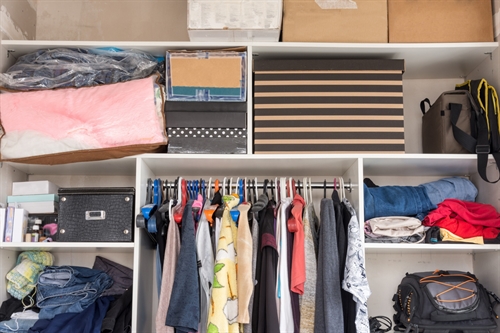When clothing and household linens wear out or go out of style, it’s time to get them out of your home. But do you know how to dispose of unwanted textiles responsibly after decluttering your wardrobe?
Can my unwanted garments be donated or sold?
It’s good practice to get the most use possible out of an item before recycling it, as each stage of recycling generates waste. So if an item can be reused, try to ensure that happens.
Good quality clothing that is in wearable condition will be welcomed by charity shops, who can sell it to raise money for their cause. Or you can use a peer-to-peer selling site like Vinted to sell your used clothing and raise some money for yourself.
If your garment is torn or damaged but can be easily repaired, do this before selling or donating, as this will increase the chances of it being reused, rather than ragged.
Charity shops can sell household linen that is clean and in good condition. Or there may be local organisations that need towels and bedding to support people setting up home. Some animal shelters or vets will take clean, dry towels and sheets that are no longer suitable for use at home – but call and ask first.
Does your council collect rags for recycling?
Some councils collect rags for recycling. Whether that is kerbside or at a drop-off point will depend where you live in the country. Use Recycle Now to find out what to do with your rags.
Find a clothing recycling point
Some organisations and businesses have a collection point for rags to raise funds, either for themselves or for a charity they support. You can drop off bags of clean, dry textiles and clothes – even if they are unwearable – and they will be sorted and recycled and sold on.
Bring back schemes
Certain clothing retailers have a bring back scheme, which means you can bring a bag of old textiles for recycling whenever you shop. They may even reward you with a voucher! Other retailers will take back only their own clothing.
What to do with badly soiled fabric
Garments that have washed stains should be fine to recycle; but a soiled or wet piece of clothing will not be welcomed by the rag merchant. If you can, wash and dry the garment before trying to recycle it.
I still need more space in my wardrobe
If your wardrobe is still crammed full, consider putting out-of-season clothing, or items that you are not wearing at present into self-storage outside your home.
Even a small storage unit, if packed efficiently, can make a world of difference to the space you have at home. Putting your winter coats into storage will free up space in your wardrobe so you can easily see what clothes you have for the summer months.
The best way to cost up self-storage is to compare a few quotes from local storage companies. When you insure your stored household goods with Store and Insure, clothing will be covered by your self-storage policy.


